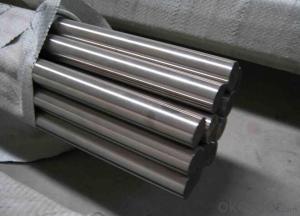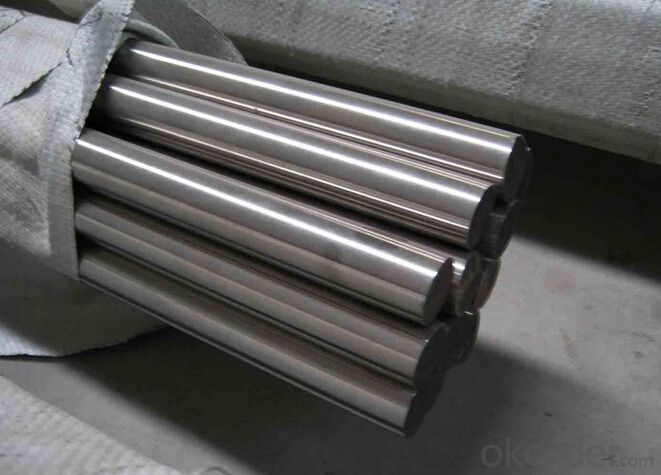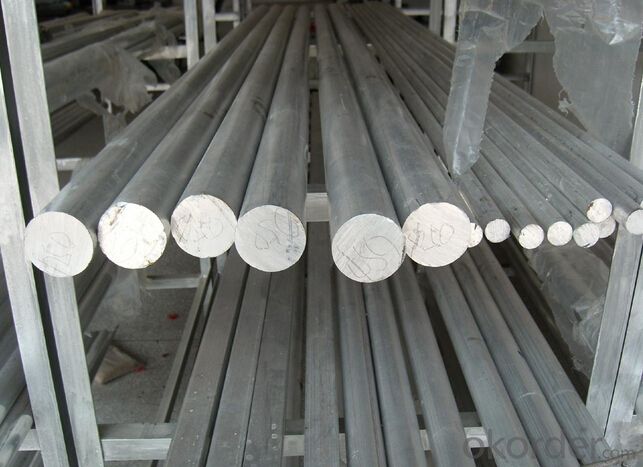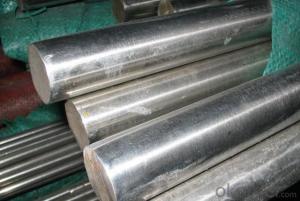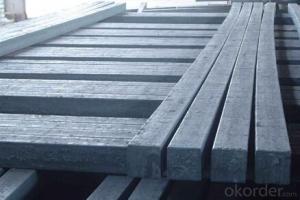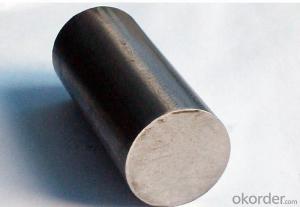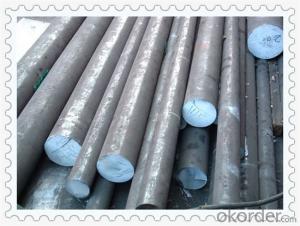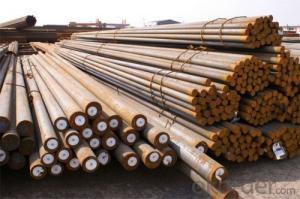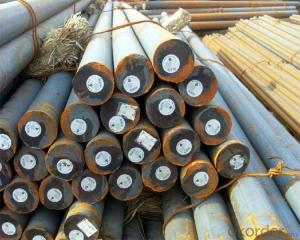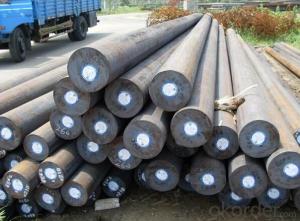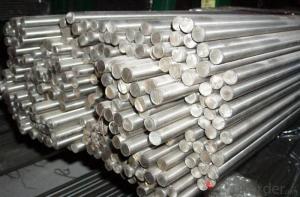Special Steel Aisi 4130 Alloy Steel Material Steel Round Bar
- Loading Port:
- China main port
- Payment Terms:
- TT or LC
- Min Order Qty:
- 25 m.t.
- Supply Capability:
- 10000 m.t./month
OKorder Service Pledge
OKorder Financial Service
You Might Also Like
Specification
The details of our Steel
1. Produce Standard: as the GB, AISI, ASTM, SAE, EN, BS, DIN, JIS Industry Standard
2. Produce processes: Smelt Iron -EAF smelt Billet - ESR smelt Billet -Hot rolled or forged get the steel round bar and plate
3. Heat treatment:
Normalized / Annealed / Quenched+Tempered
4. Quality assurance:
All order we can received Third party inspection, You can let SGS, BV,.. and others test company test and inspect our products before Goods shipping.
Product information
1.Specification of aisi 4130 alloy steel | |||||||||||||
Round bar | Diameter(mm) | Length (mm) | |||||||||||
10~300 | 2000~5800 | ||||||||||||
Plate | Thickness(mm) | Width (mm) | Length (mm) | ||||||||||
20~70 | 105~610 | 2000~5800 | |||||||||||
The specification can be customised! | |||||||||||||
2.Chemical compositon of aisi 4130 alloy steel | |||||||||||||
NO. | C | Mn | Si | Cr | Mo | Ni | P | S | |||||
Aisi 4130 | 0.38~0.43 | 0.60~0.80 | 0.15~0.35 | 0.70~0.90 | 0.20~0.30 | 1.65~2.00 | ≤0.035 | ≤0.040 | |||||
3. Mechanical properties of aisi 4130 alloy steel | |||||||||||||
Tensile str. (N/mm2) | Yield point (N/mm2) | Elongation (%) | Hardness | ||||||||||
980 | 835 | 12 | 269 | ||||||||||
4.Heat treatment of aisi 4130 alloy steel | |||||||||||||
1. Forging:Heat slowly and uniformly to 1000°C. After forging cool slowly. | |||||||||||||
2. Annealing: 780-800`C slow cooling | |||||||||||||
5.Characteristic of aisi 4130 alloy steel | |||||||||||||
(1)Good purity and homogeneity. | |||||||||||||
(2) Good machinability (Roughing, grinding and drilling). | |||||||||||||
(3) Good dimensional stability during heat treatment. | |||||||||||||
(4) Excellent preparation for nitriding, both ionic and gaseous, induction hardening to increase the mechanical properties. | |||||||||||||
6.Application of aisi 4130 alloy steel | |||||||||||||
(1)It is widely used in high-strength forgings, such as traction gear, supercharger drive gear, rear axle, the load of connecting rod, spring clip; | |||||||||||||
(2)It also manufactured tool joints and finish tools which used for oil wells below 2000m deep. | |||||||||||||
(3)For making welding parts; board;welding structure;high pressure pipe in the chemical industry. | |||||||||||||
(4)For making temperature under 450°C‘s fastener in the steam turbine, boiler manufacturing. | |||||||||||||
(5)For making under the 500°C and the high pressure's flange and nut. | |||||||||||||
(6)especially used to produce the conduit pipe which is under 400°C and the barometric pressure is 300. | |||||||||||||
Main product
High speed steel | |
AISI | M2,M4,M35,M42,T1 |
DIN | 1.3343,1.3243,1.3247,1.3355 |
JIS | SKH51,SKH54,SKH35,SKH59,SKH2 |
Cold work tool steel | |
AISI | D2,D5,D3,D6,A8,A2,O1 |
DIN | 1.2379,1.2601,1.2080,1.2436,1.2631,1.2363,1.2510,1.2327 |
JIS | SKD10,SKD11,SKD1,SKS3 |
Hot work tool steel | |
AISI | H13,H11,H21 |
DIN | 1.2344,1.2343,1.2367,1.2581,1.2713 |
JIS | SKD61,SKD6,SKD7,SKD5SKT4 |
Plastic mould steel | |
AISI | P20,P20+Ni,420 |
DIN | 1.2311,1.2738,1.2083,1.2316 |
JIS | PDS-3,SUS420J1,SUS420J2 |
Alloy structural seel | |
AISI | 5140,4340,4135,4140 |
DIN | 1.7035,1.6511,1.7220,1.7225 |
JIS | SCr440,SNCM439,SCM435,SCM440 |
Stainless steel | |
AISI | 440C,420,430 |
DIN | 1.4125 |
JIS | SUS440C |
Carbon steel | |
AISI | 1045,1020 |
DIN | 1.1191 |
JIS | S45C, G3101 |
Product show

Workshop show

Shipping
1. FedEx/DHL/UPS/TNT for samples, Door-to-Door;
2. By Air or by Sea for batch goods, for FCL; Airport/ Port receiving;
3. Customers specifying freight forwarders or negotiable shipping methods!
Delivery Time: 3-7 days for samples; 5-25 days for batch goods.
Payment Terms
1.Payment: T/T, L/C, Western Union, MoneyGram,PayPal; 30% deposits; 70% balance before delivery.
2.MOQ: 1pcs
3.Warranty : 3 years
4.Package Informations: 1) EXPORT, In 20 feet (GW 25 ton) or 40 feet Container (GW 25 ton)
2)as customer's requirement
Why choose us?
(1) The leading exporter in China special steel industry.
(2) Large stocks for various sizes, fast delivery date.
(3) Good business relationship with China famous factories.
(4) More than 7 years steel exporting experience.
(5) Good after-sales service guarantee.
- Q: Can special steel be used in the production of precision instruments?
- Yes, special steel can be used in the production of precision instruments. Special steel, known for its high strength, corrosion resistance, and heat resistance, provides the necessary durability and stability required for precise measurements and operations in precision instruments.
- Q: How does special steel contribute to the toughness of products?
- There are several ways in which special steel enhances the toughness of products. Firstly, its high strength and durability are well-known. Specific alloying elements and heat treatment processes are used in its manufacturing, which improve its mechanical properties and make it more resistant to wear and tear. As a result, products made from special steel can withstand heavy loads, impacts, and harsh environments, making them tougher and less prone to breakage. Moreover, special steel possesses excellent corrosion resistance properties. This is achieved by adding specific alloying elements like chromium and nickel, which create a protective layer on the steel's surface, preventing rust and corrosion. The ability to resist corrosion adds to the toughness of the products since they can be used in corrosive environments without experiencing degradation or loss of performance. Furthermore, special steel offers enhanced heat resistance. It can endure high temperatures without compromising its structural integrity or mechanical properties. This is particularly valuable in industries such as aerospace, automotive, and energy, where components are subjected to extreme temperatures. The capacity of special steel to maintain toughness under high heat conditions contributes to the overall reliability and longevity of the products. Additionally, special steel can be customized to meet specific requirements. Manufacturers can tailor the composition and properties of the steel according to the intended application. For instance, various types of special steel alloys are utilized in the production of cutting tools, bearings, and structural components. By selecting the appropriate grade of special steel, manufacturers can optimize the toughness of their products, ensuring they can withstand the intended use and perform reliably. In conclusion, special steel enhances the toughness of products through its high strength, corrosion resistance, heat resistance, and customizability. The distinctive properties of special steel make it an ideal choice for a wide range of applications where toughness and durability are essential factors.
- Q: What are the different high-temperature grades of special steel?
- There exists a variety of special steel grades that can withstand extreme heat and provide enhanced mechanical properties. Some of the frequently utilized high-temperature grades are as follows: 1. Stainless steel 310: Renowned for its exceptional resistance to oxidation at high temperatures, this grade boasts a high chromium and nickel content, resulting in excellent corrosion resistance and elevated temperature strength. 2. Inconel 625: Inconel alloys, which are nickel-based superalloys, exhibit remarkable resistance to oxidation and corrosion. In particular, Inconel 625 offers outstanding strength and toughness at high temperatures, rendering it suitable for applications in aerospace and chemical processing industries. 3. Hastelloy X: A notable example is Hastelloy X, a nickel-chromium-iron-molybdenum alloy that showcases extraordinary strength and oxidation resistance at elevated temperatures. It finds widespread use in gas turbine engines, industrial furnace components, and other high-temperature applications. 4. Alloy 800H: This specific grade of special steel is an austenitic alloy that possesses high resistance to oxidation, carburization, and nitridation. It frequently finds application in heat exchangers, furnace components, and petrochemical industries. 5. Titanium Grade 5: While technically not steel, titanium grade 5 is a high-temperature alloy that delivers exceptional strength and corrosion resistance at elevated temperatures. It is commonly employed in aircraft engine components, chemical processing equipment, and marine applications. These examples merely represent a fraction of the high-temperature grades of special steel available in the market. Each grade serves a specific purpose, excelling in various applications that demand extreme heat resistance and specific mechanical properties.
- Q: How is special steel used in the chemical industry?
- Special steel is used in the chemical industry primarily for its corrosion resistance, high temperature stability, and durability. It is widely utilized in the construction of chemical processing equipment, such as reactors, tanks, and pipelines, to withstand harsh and corrosive environments. Additionally, special steel alloys are employed in the production of catalysts, which are essential for various chemical reactions. Overall, special steel plays a crucial role in ensuring the safety, efficiency, and longevity of chemical processes within the industry.
- Q: How does the composition of special steel affect its properties?
- The composition of special steel greatly affects its properties. By adjusting the amounts of elements like carbon, manganese, chromium, and nickel, the steel's hardness, strength, corrosion resistance, and heat resistance can be modified. Additionally, the presence of specific elements can also enhance other properties such as toughness, wear resistance, and machinability. Therefore, careful control of the composition allows manufacturers to tailor the steel's properties to meet specific requirements for different applications.
- Q: What are the different methods for electroplating special steel?
- There are several methods for electroplating special steel, including electroless nickel plating, gold plating, silver plating, and zinc plating. Each method involves immersing the steel in a solution containing the desired plating material and passing an electric current through the solution to deposit a layer of the plating material onto the steel surface. These methods can enhance the appearance, corrosion resistance, and durability of special steel products.
- Q: What are the main characteristics of tool steel forgings?
- Tool steel forgings have several main characteristics that make them highly desirable for a variety of applications. First and foremost, tool steel forgings are known for their exceptional durability and strength. They are specifically designed to withstand high levels of stress, making them ideal for applications where toughness and resistance to wear and tear are crucial. This strength allows tool steel forgings to maintain their shape and integrity even under extreme conditions, such as high temperatures or heavy loads. Another key characteristic of tool steel forgings is their excellent hardness. Tool steel is able to achieve high levels of hardness through a process called quenching and tempering, which involves heating the steel to a specific temperature and then rapidly cooling it. This hardness makes tool steel forgings highly resistant to abrasion, making them suitable for cutting, shaping, and forming materials. Additionally, tool steel forgings exhibit excellent dimensional stability. This means that they have minimal distortion or shrinkage when subjected to heat or pressure, making them ideal for precision tooling applications. Their dimensional stability also ensures that the forgings maintain their accuracy and reliability over time, which is essential in industries such as manufacturing and engineering. Furthermore, tool steel forgings offer good machinability, meaning they can be easily shaped, drilled, and cut to meet specific requirements. This makes them versatile and adaptable for a wide range of applications, from forming complex shapes to creating intricate designs. Lastly, tool steel forgings have excellent wear resistance. This characteristic allows them to maintain their cutting edges and surfaces for extended periods, reducing the need for frequent sharpening or replacement. This wear resistance is particularly advantageous in industries such as automotive, aerospace, and tool manufacturing, where longevity and efficiency are paramount. In conclusion, the main characteristics of tool steel forgings include exceptional durability and strength, high hardness, excellent dimensional stability, good machinability, and excellent wear resistance. These characteristics make tool steel forgings highly sought after in various industries, where reliability, precision, and longevity are critical.
- Q: What are the main characteristics of high-speed steel forgings?
- Highly desirable in various industries are high-speed steel forgings, which possess several key characteristics. To begin, the exceptional hardness and wear resistance of high-speed steel forgings are noteworthy. This is a result of their composition, which typically includes elements like tungsten, molybdenum, chromium, and vanadium. These elements create hard carbides within the steel matrix, leading to a material capable of enduring high temperatures and resisting abrasion and deformation. Additionally, high-speed steel forgings exhibit excellent heat resistance, enabling them to maintain their hardness and strength even at elevated temperatures. This is particularly significant in applications where tools or components undergo intense heat during operation. Another important trait of high-speed steel forgings is their ability to retain a sharp cutting edge for extended periods. This proves advantageous in cutting tools, where an efficient and precise machining process relies on a sharp edge. The steel's high hardness ensures the cutting edge remains sharp, resulting in enhanced tool life and performance. Moreover, high-speed steel forgings demonstrate good toughness and impact resistance, making them less vulnerable to cracking or chipping under heavy loads or sudden impacts. This ensures their durability and reliability in demanding applications. In addition to these mechanical properties, high-speed steel forgings possess excellent machinability. They can be easily shaped, formed, and machined into intricate geometries, making them ideal for producing complex components or tools. Overall, the main characteristics of high-speed steel forgings encompass exceptional hardness, wear resistance, heat resistance, cutting edge retention, toughness, impact resistance, and machinability. These qualities render them highly sought-after in industries such as aerospace, automotive, tooling, and machining, where performance, reliability, and longevity are of utmost importance.
- Q: How does special steel resist corrosion?
- Special steel resists corrosion due to the presence of specific alloying elements, such as chromium or nickel, which form a protective layer on the surface of the steel. This layer acts as a barrier, preventing oxygen and moisture from reaching the underlying steel and thus preventing the formation of rust or corrosion.
- Q: What are the properties of low alloy steel?
- Low alloy steel is a type of steel that contains a small amount of alloying elements, typically less than 10%. These alloying elements can include elements such as manganese, chromium, nickel, and molybdenum. The properties of low alloy steel can vary depending on the specific alloying elements used, but generally, low alloy steel exhibits improved strength, hardness, and toughness compared to regular carbon steel. It also offers enhanced corrosion resistance and can withstand higher temperatures. Additionally, low alloy steel has good weldability and can be easily formed and machined.
Send your message to us
Special Steel Aisi 4130 Alloy Steel Material Steel Round Bar
- Loading Port:
- China main port
- Payment Terms:
- TT or LC
- Min Order Qty:
- 25 m.t.
- Supply Capability:
- 10000 m.t./month
OKorder Service Pledge
OKorder Financial Service
Similar products
Hot products
Hot Searches
Related keywords
